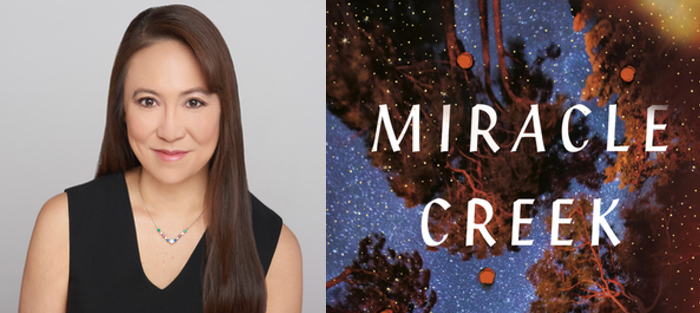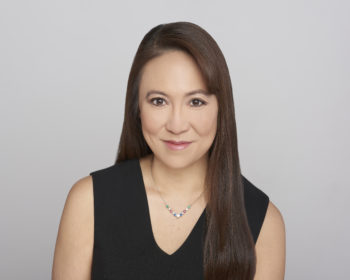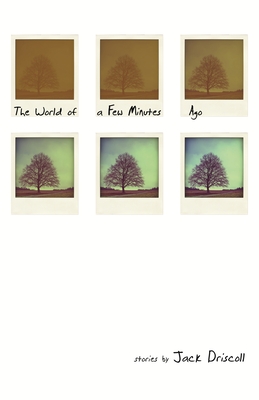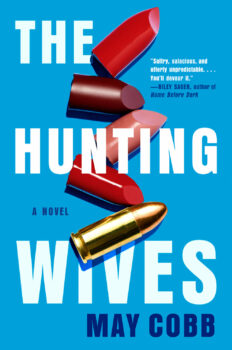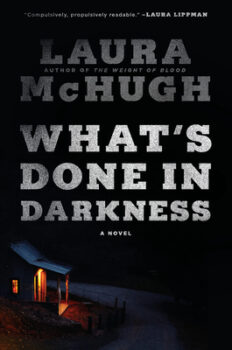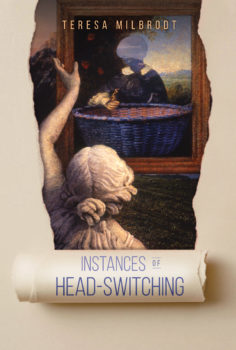It took me a while to get around to reading Angie Kim’s Miracle Creek. Not because I didn’t think it would be good—several writers I respected had recommended it, and the Times had called it “a fascinating study of the malleability of truth”—but because I knew it would be a difficult, even a painful read. I knew that Kim’s novel revolved around an accident at a Hyperbaric Oxygen Therapy (HBOT) chamber that resulted in the death of a special needs child. I knew that that child was an eight-year-old boy named Henry with high-functioning autism—a boy who sounded very much like my own son Henry, also an eight-year-old boy with high-functioning autism.
In some ways, the reading experience was even harder than I’d anticipated. Not only did the Henry in the book look and act very much like my Henry, but his mother, Elizabeth, reminded me of myself in some uncomfortable ways. For much of the novel, it’s unclear whether Elizabeth might be responsible for the tragedy at the H-Bot chamber. What is clear is that her desire to find the best means to treat her child’s disability has caused her to overlook his need for affection and support. And though I couldn’t help condemning her lack of awareness of her son’s feelings, I also related to her deep frustration about the way her own life has come to revolve around his needs.
What follows is a novel unlike anything I’ve ever read. As the reader learns more about both Elizabeth and the Yoos, the Korean immigrant family who run the H-Bot chamber, Kim manages to combine the propulsive plot we expect from a suspense novel with the in-depth characterization and psychological nuance found in the best literary fiction.
Interview:
Polly Atwell: I wanted to start with a little bit about your background. I know you began your career as a trial lawyer. Can you tell me how you came to writing fiction?
Angie Kim: Writing is my fifth career, I like to say. I started as a trial lawyer, and I loved being in the courtroom, but I did not like the other 95% of my job. After that I became a management consultant and transitioned to the business world, and then I left that company with a couple of colleagues to become a dotcom entrepreneur during the heyday in the 90s. Then, just as we were about to go public, the market crashed and we were forced to sell our business basically for scraps.
The month that the sales of our company went through was actually the month that I gave birth to my first child. That was a really, really difficult time, because we had 450 employees and I think I personally had to fire 420 of them, all of which took place while I was pregnant in my third trimester.
Afterwards, I decided to take some time off and stay home with my first child. However, it would turn out that each of my three children would have medical issues that required a lot of management when they were little. All of them are fine now, thankfully, but it was a very stressful time, and I ended up being a stay-at-home mom.
A lot of my friends said that I should really write about my experience, both because it would be cathartic and because it would help other parents who’ve gone through similar things. So I started just writing, and I became very, very passionate about it. It was like I’d found the passion that I had been looking for throughout the four other careers that I’d gone through. But I didn’t want to publish these essays because I was worried about my kids’ medical privacy.
Then my husband said, “Well, why not try fiction?” And I was like, “Fiction?” I’d never written fiction before, but I started taking classes, both online and also here in the DC area. The first story that I ever wrote, I was able to get published in New Letters, a literary journal that I respected and loved. Having some success in that area gave me the confidence to say, okay, I can try to tackle writing a novel at this point.
I think that’s so helpful for readers to hear. There are a lot of people who don’t go the traditional MFA route, so it’s great to hear about a writer who has come to it later in life and experienced success.
Yeah, you don’t have to be a twentysomething for the publishing world to get excited about your work. Miracle Creek was published the same week as my 50th birthday.
I think I read that you worked on Miracle Creek for a good while too. Did you always think of it as a crime or a suspense novel?
I knew there was going to be this tragedy with the hyperbaric oxygen therapy chamber, but for six months all I did was freewrite in a notebook that I can’t even read now because my handwriting is so bad. I was trying out the various characters’ voices just to get to know them better. In the spring of 2013, I sat down to actually start drafting it.
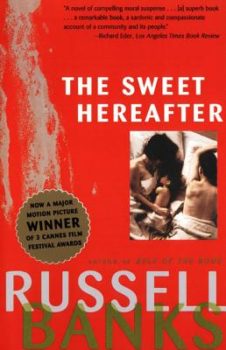 I thought at first that it would be an exploration of these characters’ lives leading up to the explosion and then the consequences of the explosion. But then I started thinking about Russell Banks’s The Sweet Hereafter and Mystic River, by Dennis Lehane— novels that start with something tragic happening and then deal with the consequences. I decided that the inciting incident would be this tragedy, but I didn’t know that it was going to have the courtroom element until I really started drafting.
I thought at first that it would be an exploration of these characters’ lives leading up to the explosion and then the consequences of the explosion. But then I started thinking about Russell Banks’s The Sweet Hereafter and Mystic River, by Dennis Lehane— novels that start with something tragic happening and then deal with the consequences. I decided that the inciting incident would be this tragedy, but I didn’t know that it was going to have the courtroom element until I really started drafting.
And clearly that courtroom element is informed by your history as a lawyer. I was so compelled by the courtroom scenes because there’s this inherent suspense in them. As readers, we have information that the lawyers don’t have, and we’re waiting to see whether it’s going to come out. What was it like writing those scenes?
The courtroom scenes are probably my favorite too. Usually I’m a really slow writer—it’s just painstaking for me—but writing the dialogue scenes allowed me to pretend I was back in the courtroom, and that was fun. I could give the witnesses the exact words I wanted them to say and have them obey. It freed me from the anxiety I have about word choice and flow and punctuation and all that stuff, and allowed me to write really quickly.
It was almost like what I did when I was planning real cross-examinations. You plan out the questions that you’re going to ask the witness to get them to admit what you want to reveal. In writing these scenes, I knew what I wanted the lawyers to try to get out of the witnesses, and then I was trying to see the scenes inside my head and hear the voices, just like I would in a real trial. It was almost like transcribing rather than writing.
I don’t want to give too much away, but the revelation of who is responsible for the fire definitely comes as a surprise to the reader. Did you know who the culprit was from the very beginning?
I did not. I didn’t know until about a year into the writing. I started with an outline, but it wasn’t a very helpful outline because I didn’t know who started the fire. I kept writing more chapters and then coming back to the outline and changing it. I think it was just more of a psychological comfort for me more than anything else.
In the back of my mind, I was a little worried about reaching the final destination, but I just kept on telling myself, “All you need to worry about right now is what’s happening in this scene.” Then I’d go forward page by page, sentence by sentence.
You’ve gotten so much great press so far, and you’ve done a lot of events, and I’m sure you’ve been hearing from readers online as well. What kinds of responses are you hearing?
One thing I love is interacting directly with the readers. I just did an in-person book club visit last night, and I love those because it’s so fun to chat as if I were another reader. I get to talk about the things that the characters do that frustrate me, because there are plenty of those.
I also just like reading the good reviews on Goodreads and Amazon and blogs. But the thing that I’ve loved the most is getting emails from readers who have a special connection to immigrant communities or special needs parenting. Some of those readers have reached out to me and written really heartfelt messages that mean a lot. Some of them have told me that they loved reading the novel because it made them feel less alone and less isolated, knowing that other people go through what they’ve gone through and maybe think some of the shameful thoughts that they’ve been feeling guilty about.
Those types of personal responses have really meant a lot, maybe partly because I didn’t anticipate them. I’ve fantasized about getting a New York Times review, but the reader responses surprised me, because I hadn’t really thought about that part of writing a novel.
I imagine that people sometimes get angry with these characters, as well. In this interview series, we always talk about the debate over unlikeable female characters. Do some readers see Elizabeth as unlikeable?
I don’t know if most readers see her that way. People seem to recognize that the point of view is a close third, where you’re hearing all of the characters’ thoughts, including things that they’re ashamed of. Because shame is such a strong emotion, those are the moments that these characters are choosing to fixate on the most, so in some ways, they’re actually giving a disproportionately negative view of themselves.
I think these characters are hard on themselves and I’m pretty hard on the characters, especially the characters like Elizabeth or Mary who are very close to me personally. As writers, we do tend to be a little harder on the characters that we actually identify with the most, but I don’t think a complex human being exists on this planet who doesn’t have some of these unlikable, shameful thoughts.
With a character like Elizabeth, I think a lot of people started out maybe not liking her, but then came to understand her better. By the time her last chapter rolls around, you really see what made her into the person that she is today. Whereas with somebody like Matt, readers start out liking him and thinking, Oh, what a nice guy he is, and then end up just despising him. Then, of course, you do get the one-star reviews on Goodreads or whatever, where people are saying none of these characters are likeable, they’re all despicable. I guess some people do feel that way.
I read one interview where you compared your experience of coming to the States as an immigrant and feeling limited in your language skills to having autism. How did that inform the characters of Henry and TJ.?
It’s funny, because my next novel also has a character on the autism spectrum who is nonverbal. My husband asked me, “Why are you so interested in this issue?” Then I was really trying to sort of psychoanalyze myself, and I remembered this medical conference that I went to about ten years ago, where a doctor was talking about a nonverbal patient she had, a twelve-year-old girl, who finally took one of those typing pads and typed in Help me. The doctor realized that she’d been treating this girl like she was a baby, from an intelligence perspective, but all the time she had a mind that was trapped in there.
I think that was a poignant moment for everybody, but it seemed to hit me especially hard. I was just sitting there sobbing. Recently I was thinking back to that moment and why I reacted in such a strong way, and I remembered the time when I first came to the States. I knew I had the same intelligence and abilities that I did in Korea, but I could no longer understand anyone, and I was made to feel less-than and inferior and stupid and all of these things.
For me, that was a short-term thing. I knew I would grasp English at some point. But then I thought, “How must it feel for somebody who is unable to communicate when people are judging you, and you’re stuck that way possibly for life?” I just can’t even imagine the pain of that, and the frustration.
I don’t want to totally equate what I experienced with somebody who is nonverbal, because I think that does a disservice to people with autism. I could still speak in a different language. But for nonverbal people on the spectrum, you’re dealing with a lifelong frustration. I think my experience just gives me a little glimpse into what that must be like.
Even though my son is verbal, that’s a helpful thing for me to think about too.
Can I ask you a question now? Did it freak you out when you saw that the little boy in my novel had the same name as your son?
You know, the reason I’m speaking to you now rather than when your book came out is because I felt that I had to prepare myself to read it. I knew that it would upset me. I waited until my schedule was pretty clear, and even after that, I sometimes had to put it down and have a cry. So much of what you had to say about special needs parenting was a lot like my experience, and even though it’s painful, it’s also really healing in a way to see that represented.
That means a lot to me to hear, because that’s what I was trying to do. I think the parenting struggle of having a child who is different, it’s such a universal thing in some ways.
You’ve probably heard this from other people too, but I was just assuming the whole time I was reading that you had a child with autism. The party scene, where Elizabeth is trying to get Henry to respond to her and he won’t—I think I’ve been at that party!
I have too! None of my children have autism, but we dealt with speech delays with my oldest child because of his hearing loss, and for a long time we didn’t know exactly what was going on. I think that party scene basically happened in my basement.
You feel such a stigma in those moments, because communication is so important. People say it doesn’t matter when they do things as long as they’re healthy and you’re just like, yeah, right.
My next question is a little bit lighter. I don’t think I’ve ever asked a writer about cover design, but this is one of my favorite covers of all time. I just think it’s so gorgeous. I was just wondering what that process was like, and if you worked closely with a designer.
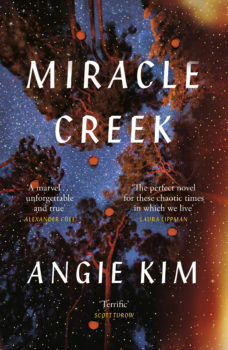 I really didn’t, and it’s kind of a funny story. One day my editor called me and said, “Okay, we’re getting your cover design back this week.” I was expecting to see it, but then I didn’t hear anything, so I was like, “So where’s the cover?” And my editor said, “Oh, I didn’t like it, we had to get somebody else to do it.” She was just very mysterious about the whole thing. She was just like, “It’s in the works, we’ll show it to you later when we have something.” I have in my contract that I was supposed to have a cover consultation and approval rights, so I thought it was kind of strange. I didn’t even know who was working on it.
I really didn’t, and it’s kind of a funny story. One day my editor called me and said, “Okay, we’re getting your cover design back this week.” I was expecting to see it, but then I didn’t hear anything, so I was like, “So where’s the cover?” And my editor said, “Oh, I didn’t like it, we had to get somebody else to do it.” She was just very mysterious about the whole thing. She was just like, “It’s in the works, we’ll show it to you later when we have something.” I have in my contract that I was supposed to have a cover consultation and approval rights, so I thought it was kind of strange. I didn’t even know who was working on it.
A couple months went by, and then she calls me and she’s like, “Okay, I found the cover. I love it. It’s so good.” I was like, “Okay, send it to me in an email.” And she said, “No, I’m overnighting it, because I want you to get the full effect.” What she sent me is basically the cover as it was printed. I loved it, because it immediately made me think of Elizabeth or Mary lying down by the creek looking up at the trees, and then you have the red dots that could be embers or cigarette burns. But at the same time, the trees also kind of look like blood vessels or nerves. It’s appropriate in a lot of ways.
You mentioned the novel that you’re working on, and I don’t know how much you want to say about it, but can you tell me a little bit about what’s next for you?
Absolutely. Talking about it in public is a way for me to tell myself, “Okay, I need to really get to work on this.” It’s called The Happiness Quotient, and it’s based on a short story I wrote. It’s about a ten-year-old boy on the autism spectrum who is nonverbal. At the beginning of the novel, he goes on a walk with his father who’s the primary caregiver, and later that day only the boy returns home.
Because he’s nonverbal, he can’t tell the police or his family what happened. From that point, the novel is really about the two older siblings, who are fraternal twins—one boy and one girl. One of the siblings is working with the brother, trying to get him to communicate through typing and assistive technologies, and the other is looking through the dad’s research. He was a social scientist slash philosopher working on something called the happiness quotient, which is a mathematical formula to try to maximize happiness. He was always subjecting his family to these crazy, sometimes funny, sometimes ridiculous experiments to try to prove his theories and refine this formula, and she thinks it might somehow be related to his disappearance.
Wow, that sounds amazing. I can’t wait to find out what happens! I’ll try to be patient.

